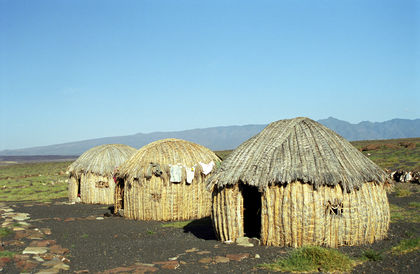Kenya - Agriculture

Agriculture remains the most important economic activity in Kenya, although less than 8% of the land is used for crop and feed production. Less than 20% of the land is suitable for cultivation, of which only 12% is classified as high potential (adequate rainfall) agricultural land and about 8% is medium potential land. The rest of the land is arid or semiarid. About 80% of the work force engages in agriculture or food processing. Farming in Kenya is typically carried out by small producers who usually cultivate no more than two hectares (about five acres) using limited technology. These small farms, operated by about three million farming families, account for 75% of total production. Although there are still important European-owned coffee, tea, and sisal plantations, an increasing number of peasant farmers grow cash crops.
From independence in 1963 to the oil crisis in 1973, the agricultural sector expanded by undergoing two basic changes: first, widespread acceptance of private ownership (replacing tribal ownership) and cash crop farming; second, the success of intensive nationwide efforts to expand and upgrade the production of African smallholders. Before World War II (1939–45) ended, agricultural development occurred almost exclusively in the "White Highlands," an area of some 31,000 sq km (12,000 sq mi) allocated to immigrant white settlers and plantation companies. Since independence, as part of a land consolidation and resettlement policy, the Kenya government, with financial aid from the United Kingdom, has gradually transferred large areas to African ownership. European-owned agriculture remains generally large-scale and almost entirely commercial.
After the 1973 oil crisis, agricultural growth slowed as less untapped land became available. Government involvement in marketing coupled with inefficient trade and exchange rate policies discouraged production during the 1970s. Coffee production booms in the late 1970s and in 1986 have in the past temporarily helped the economy in its struggle away from deficit spending and monetary expansion. Although the expansion of agricultural export crops has been the most important factor in stimulating economic development, much agricultural activity is also directed toward providing food for domestic consumption. Kenya's agriculture is sufficiently diversified to produce nearly all of the nation's basic foodstuffs. To some extent, Kenya also helps feed neighboring countries.
Kenya is Africa's leading tea producer, and was fourth in the world in 1999, behind India, China, and Sri Lanka. Black tea is Kenya's leading agricultural foreign exchange earner. Production in 1999 reached 220,000 tons. Tea exports were valued at $404.1 million in 2001, or nearly 18% of total exports. The tea industry is divided between small farms and large estates. The small-scale sector, with more than 260,000 farmers, is controlled by the parastatal Kenya Tea Development Authority. The estates, consisting of 60–75 private companies, operate on their own.
Coffee is Kenya's third leading foreign exchange earner, after tourism and tea. In 2001, coffee earnings totaled $91.8 million. Production in 2001/02 amounted to 52,140 tons. Similar to the tea sector, coffee is produced on many small farms and a few large estates. All coffee is marketed through the parastatal Coffee Board of Kenya. The suspension of the economic provisions of the International Coffee Agreement in July 1989 disrupted markets temporarily, driving coffee prices to historical lows.
Kenyan horticulture has become prominent in recent years, and is now the third leading agricultural export, following tea and coffee. Fresh produce accounted for about 30% of horticultural exports, and included green beans, onions, cabbages, snow peas, avocados, mangoes, and passion fruit. Flowers exported include roses, carnations, statice, astromeria, and lilies.
Kenya is the world's largest producer and exporter of pyrethrum, a flower that contains a substance used in pesticides. The pyrethrum extract, known as pyrethrin, is derived from the flower's petals. A drop in production during the mid-1990s was due to increasing production costs, disease damage, and slow payment by the parastatal Pyrethrum Board of Kenya. The growing demand for "organic" and "natural" pesticides has increased international demand for pyrethrin, despite the existence of synthetic chemical substitutes. Kenya also produces sisal, tobacco, and bixa annatto (a natural food coloring agent) for export.
Other important crops in 1999 were sugarcane, 5,200,000 tons; corn, 2,110,000 tons; wheat, 135,000 tons; rice, 40,000 tons; and cotton, 5,000 tons. Smallholders grow most of the corn and also produce significant quantities of potatoes, beans, peas, sorghum, sweet potatoes, cassava, bananas, and oilseeds.
it was easy to understand. helped me with my prep and for that i am gratefull
keep it up.
This was very helpful for me to complete my essay.